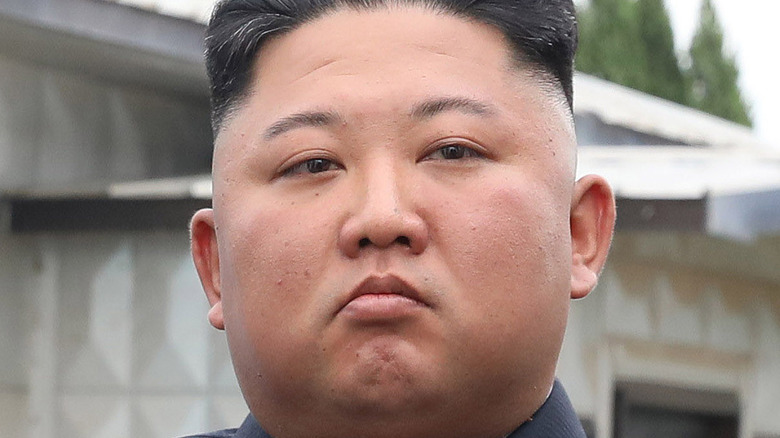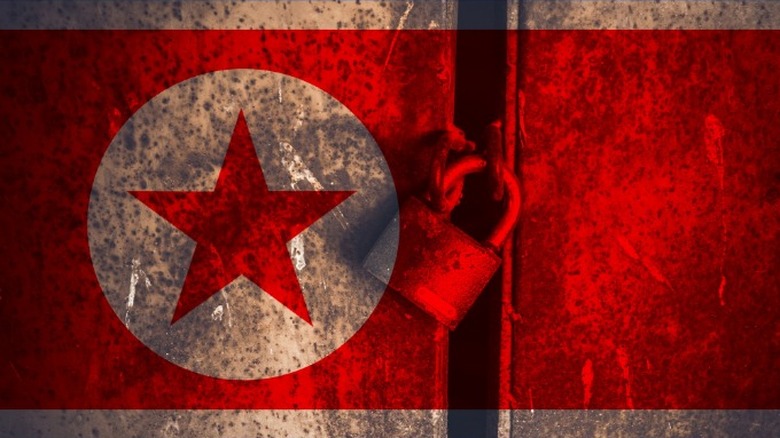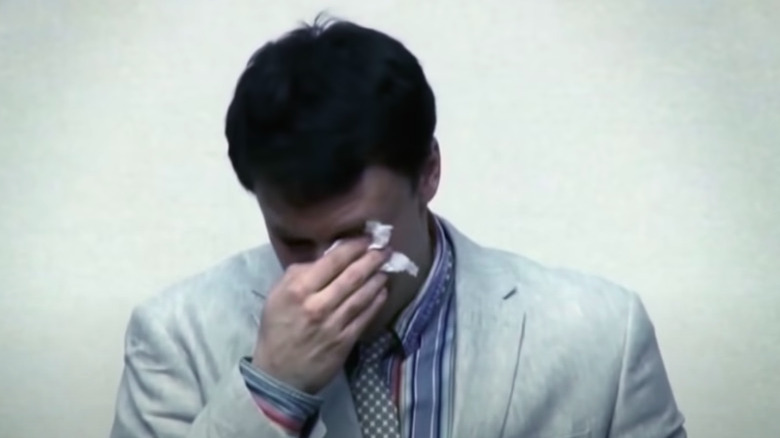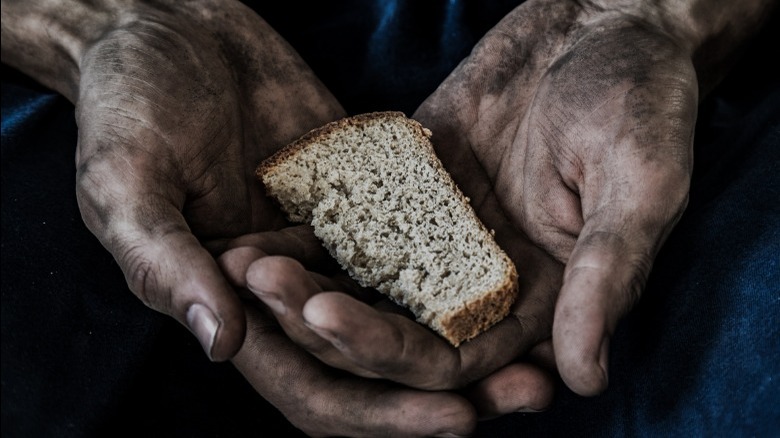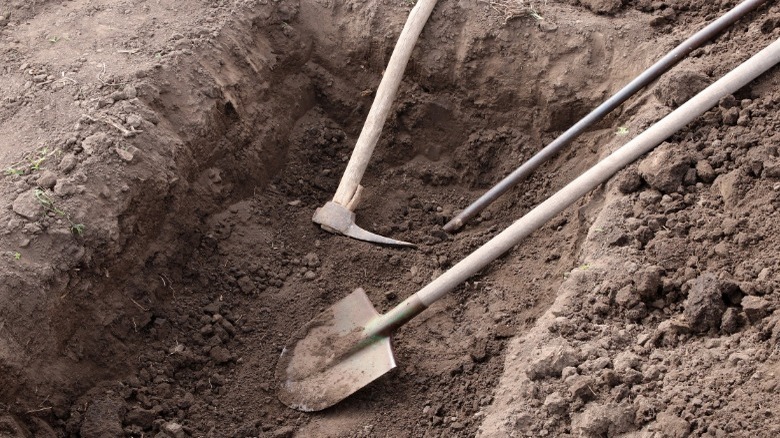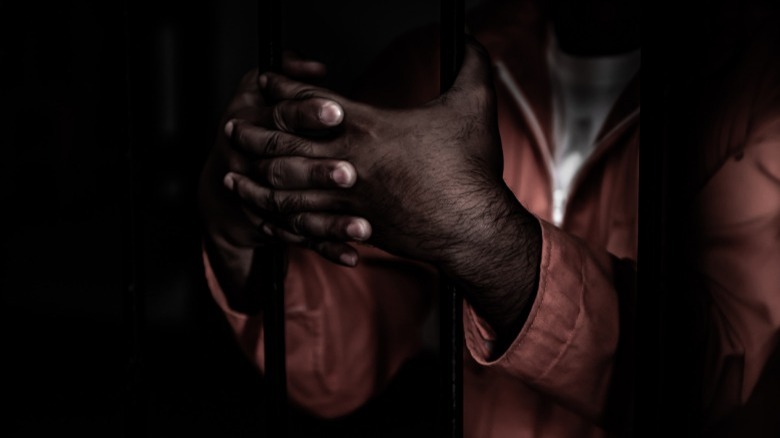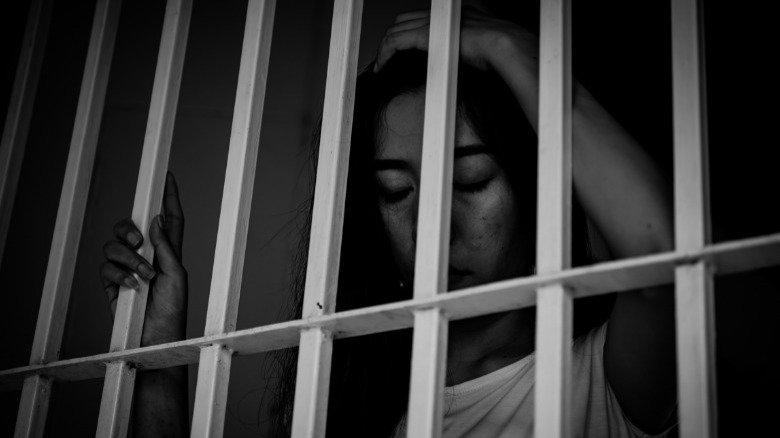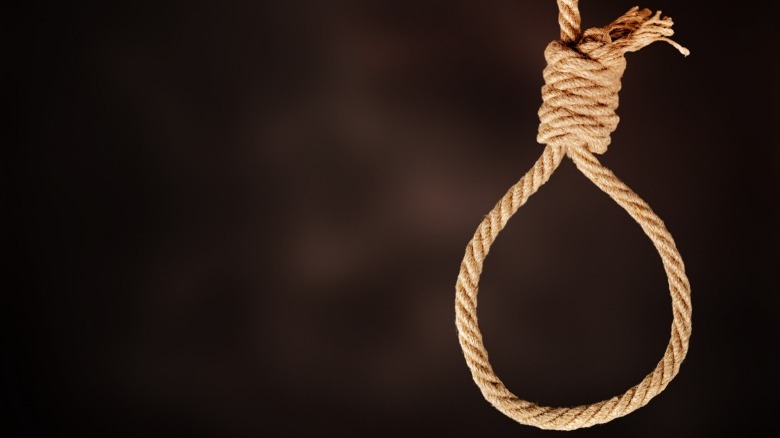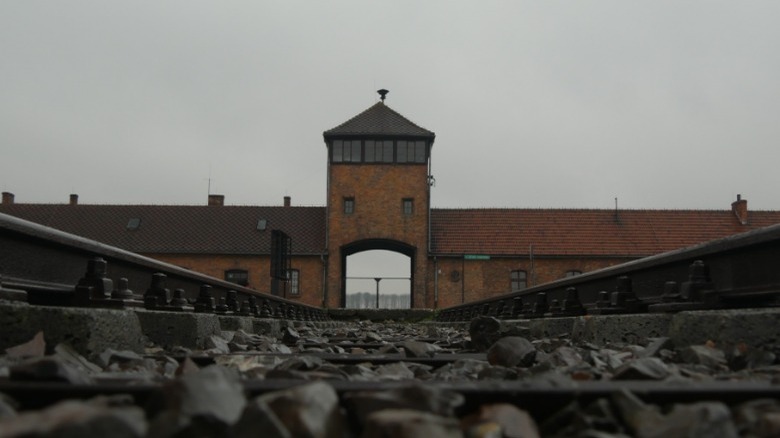Here's Why You Probably Wouldn't Survive Inside A North Korean Prison
North Korea has a history of imprisoning both foreigners and its own citizens with terrible brutality. In fact, Freedom House ranks North Korea as one of the most oppressive nations on earth, scoring it 0/40 for political rights and 3/60 for civil rights.
According to the U.S. Department of State, North Korea has "six types of detention facilities: kwanliso (political penal-labor camps), kyohwaso (correctional or re-education centers), kyoyangso (labor-reform centers), jipkyulso (collection centers for low-level criminals), rodong danryeondae (labor-training centers), and kuryujang or kamok (interrogation facilities or jails)." This multi-tiered penal system has been described as "gulag-like" by Time, referencing the Soviet Union's gulag camps that killed between 1.2 to 1.7 million people from 1918 to 1956 (via Britannica). The Committee for Human Rights in North Korea drew similar parallels in their report entitled The Hidden Gulag, which found that North Korea's penal system violates 13 articles of the International Covenant on Civil and Political Rights.
The conditions are so awful that the Asan Institute for Policy Studies estimates the fatality rate at 25%. Here are the reasons why you probably wouldn't survive in a North Korean prison.
Prisoners are victims of arbitrary detention
According to The Hidden Gulag, prisoners are victims of "arbitrary detention," which involves random punishments that bear no relation to the constitution or court system. In other words, punishment is delivered at the personal discretion of the imprisoners.
For example, in 2014, Lim Ok Kyung was arrested for smuggling Chinese appliances. She described her treatment to Human Rights Watch, "First, they said to write everything, everything from the moment of my birth until the present. I had to write my whole story for hours." After this strange and arbitrary task, Kyung was accused of lying in her statement and was subjected to repeated beatings, "Some guards who passed by would hit me with their hands or kick me with their boots ... For five days, they forced me to stay standing and didn't let me sleep."
As outrageous as her Kyung's treatment was, other victims' experiences have been even more Orwellian. The Hidden Gulag reported that some suspects are detained for being "wrong-thinkers" and are sometimes accused of having "wrong knowledge." If a citizen is accused of these bogus "crimes," they will be banished to a labor colony and receive no judicial process. Sentences for these baseless ideological "crimes" are usually for life. A notable example of "wrong-knowledge" occurred in the late 1980s, when North Koreans studying in Eastern Europe were summoned home during the collapse of the Soviet Union. When they returned, many were imprisoned to stop them from spreading their knowledge of socialism's downfall (via The Hidden Gulag).
Foreigners can expect very harsh treatment
Several foreigners have been victimized by the North Korean regime. Perhaps the most notorious example is that of Otto Warmbier, a 22-year-old student who visited the country with a tour group on December 29, 2015 (via The Atlantic). Days later, on January 2, Warmbier was detained at Pyongyang airport. The regime announced the arrest 20 days later, stating Warmbier was being held for committing "anti-republic activities." On February 29, Warmbier was forced to announce he had stolen a propaganda sign from his hotel, for which he was sentenced to 15 years of prison and hard labor. In his dubious "confession," Warmbier said that he had stolen the item for the Friendship United Methodist Church, who offered him a $10,000 car in exchange for the sign.
In June 2017, some 16 months later, the Trump administration learned that Warmbier was unconscious, so a diplomatic mission was sent to resolve the issue. On June 13, Insider reported that Warmbier had been medically evacuated to Sapporo, Japan en route to Cincinnati, Ohio, where his parents Fred and Cindy waited eagerly. Tragically, it was revealed that Warmbier had been in a year-long coma, and was now in a state of unresponsive wakefulness, according to GQ. Warmbier died six days later on June 19.
The hardship Warmbier experienced in North Korea may never be known. Pyongyang blamed his death on botulism and an adverse reaction to a sleeping pill, but this was dismissed by American authorities. Warmbier's father Fred was convinced that his son had been tortured, citing how his straight teeth had become crooked and that his foot bore a large scar.
And so can North Korean citizens
North Korean citizens comprise the overwhelming majority of the prison system. After all, North Korea is among the most ethnically homogenous countries in the world, according to The Washington Post. The BBC reported that North Korea's kwanliso prisons are home to approximately 80,000 to 120,000 people, and the accounts of their lives make for horrible reading. A UN report from July 2021 highlighted the continuing human rights violations in the North Korean prison system. The report drew on many testimonies, including one from a man who was brutalized for moving very slightly while being forced to kneel for four hours, "I was beaten with a gunstock during this punishment, and then beaten again because I didn't get up after being hit the first time."
Female detainees are given no special treatment. One woman remembered being attacked with firewood, "The skin on my face tore open, my chin became dislocated and four of my teeth were knocked out." Another female victim said, "Some detainees were asked to place their heads on the bars [of the cell] and the guards would beat us with a club ... we were just like punching bags to them."
Other punishments are less violent but still sadistically draconian. For example, a cell with 12 detainees were forced to do 1,000 squats because one of them had been snoring. Younger inmates were able to pass this cruel test, but the elders reportedly "fainted on the spot."
The food, water, and accommodation are terrible
According to the U.S. Department of State, conditions in North Korean facilities are "life threatening" because of poor sanitation, limited medical care, considerable overcrowding, and scarce food supplies. One labor camp detainee said, "We were fed only cornmeal, about 100 grams three times a day." Rationing was so poor that both detainees and guards relied on visiting family members to supplement the government produce. According to two escapees, the combination of dire nutrition and relentless hard labor caused starvation and death (via the UN). The Hidden Gulag found that prisoners are driven to eat anything they can find, which includes grass, bark, plants, rats, snakes, and animal foodstuffs.
Former inmates interviewed for The Hidden Gulag remembered their shock when they arrived at the camps. Their fellow detainees were emaciated husks draped in torn rags and covered in filth, and their bodies were hunched and broken from years of labor and malnourishment. Some even had digits and limbs missing, which had succumbed to frostbite or lost in work accidents.
The woeful food and accommodation is a big contributor to prison mortality. According to Go Myong-Hyun from the Asan Institute for Policy Studies, "Eight in 10 North Korean prisoners suffered from malnutrition before death ... Poor diet and sanitation appeared to worsen the inmates' digestive system diseases, while congestion led to a high rate of respiratory ailments."
Your days will be spent performing back breaking hard labour
According to The Hidden Gulag, hard manual labor occupies prisoners 12 hours a day, seven days a week. Detainees are allowed just one rest day per month as well as three national holidays, which are New Year's Day and the birthdays of Kim Il-sung and Kim Jong-Il. Both men and women are forced to work in farming, logging, mining, and factory work. They are typically assigned work quotas and are punished should they fail to meet them, usually through beatings or withdrawal of food.
One woman recalled the disregard for safety, "[I was] loading and unloading cement ... [I] couldn't help breathing in the cement... wads of cement were mixed in our phlegm when we spit it out ... no matter how hard we washed our hands, the cement did not easily come off, so our hands became cracked and dry" (via United Nations).
The penal system's slave labor serves an important role in the North Korean economy, which relies on a "voluntary" hard labor to operate. Joanna Hosaniak of the Citizens' Alliance for North Korea Human Rights said, "Generations of people are born, live, and die in the mining zones and experience the worst type of persecution and discrimination throughout their lifetime."
They view prisoners as sub-human
The seemingly endless violence and cruelty is the result of a very deliberate mindset. A detainee at Onsong Jip-kyul-so Detention Center said, "The detainees, who were assigned to make bricks, were told that they were not human beings but dogs and pigs" (via The Hidden Gulag). According to The Infographics Show, a former guard said that her fellow guards were brainwashed to believe that the prisoners were monstrous and less than human. However, she would later find out that some of these inmates were arrested on bogus charges such as foraging for food or following the Christian faith.
This "othering" of citizens is reflective of North Korea's rigid caste system, which is known as songbun (via The Diplomat). Established by Kim Il-sung, the founder of North Korea, songbun is split into three broad categories — "core" (haeksim), the patriotic governing class; "wavering" (dongyo), the sufficiently obedient middle class; and "hostile" (choktae), who are accused of being "anti-party and anti-revolutionary forces." Many in the "hostile" group are condemned by their families' historic sympathies for Japan or other anti-Kim forces and ideas.
The North Korean penal system has a deeply ingrained hatred of foreigners, too. According to Newsweek, North Korean children are taught to view Americans as murderous brutes. Much of this education comes from a twisted account of the Korean War, which is on full display at the Sinchon Museum of American War Atrocities. So, if you are an American in North Korea, do not expect clemency should you be arrested, as you will likely be caricatured as an archenemy of the state.
Women are abused and 'disappeared'
According to Amnesty International, women at the Kwanliso 16 prison are abused before "disappearing." A former guard said after being assaulted by officials, "the women had to die because the secret could not get out. This happens at most of the political prison camps." However, even if victims were able to speak of their assault, which is a taboo in North Korea, it is likely that they would be blamed (via Amnesty).
Speaking with the United Nations, a female detainee remembered the absurdly harsh punishments enacted on women, "I was not supposed to make eye contact with officers outside the cell. However, I happened to make eye contact with an officer without knowing the rule. Because of my mistake, all of the detainees in my cell were punished [and beaten]."
According to detainees interviewed by the United Nations, all of this violence and abuse is committed by men, as all prison guards are men. This violates the Mandela Rule, which states that women's facilities should be operated by female staff. Women are also subject to upended menstrual cycles, increased risk of sexual violence during strip searches, and even forced abortions.
If you or anyone you know has been a victim of sexual assault, help is available. Visit the Rape, Abuse & Incest National Network website or contact RAINN's National Helpline at 1-800-656-HOPE (4673).
There are routine executions
Summary executions are common in the North Korean penal system. In fact, the Transitional Justice Working Group identified 318 execution sites across North Korea, which are used to serve the ultimate punishment for a raft of bogus "crimes." Some victims are hanged, but more are shot by firing squads (via Hidden Gulag). One victim recalled how guards took two women away after they told them they had converted to Christianity when they lived in China. When the guards returned, they said the women had been executed. Those who try to escape are met with fatal force. Detainee Kim Young-soon remembered what happened to two attempted escapees, "They were brought to a stage after they were badly beaten. The prisoners were tied to wooden stakes and shot three times in their head, chest, and feet."
The Hidden Gulag stated that the vast majority of interviewed detainees had witnessed executions. This is because it was compulsory to assemble and witness these barbarous acts, which caused much distress and fear among the penal population. The Transitional Justice Working group said that executions are "a core method of inciting fear and deterring citizens from engaging in activities deemed undesirable by the regime."
Not even high-ranking family members are safe. In 2013, Kim Jong-Un arrested and executed his uncle Jang Song-thaek, whom he accused of treason. North Korean media described Jang as "worse than a dog" and "despicable human scum," according to the Hindustan Times.
A senior judge and Holocaust survivor compared North Korean prisons to Nazi camps
Thomas Buergenthal, a judge and Holocaust survivor who served at the International Court of Justice, concluded that North Korea's prisons are "as terrible or even worse" than the Nazi camps he suffered, according to the Independent. Buergenthal, who survived Auschwitz, Sachsenhausen, and the Kielce ghetto, said, "I believe that the conditions in the [North] Korean prison camps are as terrible, or even worse, than those I saw and experienced in my youth in these Nazi camps and in my long professional career in the human rights field."
Joined by judges who ruled on war crimes in Rwanda, Yugoslavia, and Cambodia, Buergenthal published a report that accused the North Korean prison system of committing 10 international war crimes, including murder, enslavement, torture, and sexual violence. South African judge Navi Pillay added, "There is not a comparable situation anywhere in the world, past or present ... This is really an atrocity at the maximum level, where the whole population is subject to intimidation."
Alas, holding North Korea to account is paralyzed by the UN Security Council, which requires agreement from all five permanent members. Two of them, China and Russia, have indicated they would veto any action against the North Korean state.
